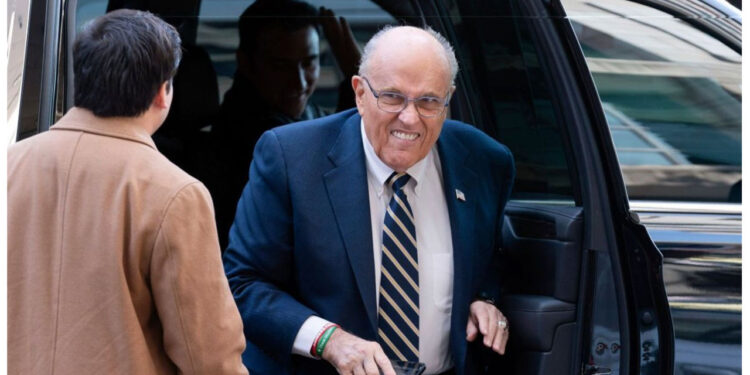On Friday, Rudy Giuliani asked a federal judge in New York City to modify the stay of his bankruptcy case, enabling him to contest the $148 million defamation award that former Georgia election workers Ruby Freeman and Wandrea “Shaye” Moss had won.
In a 15-page petition, attorney Gary Fischoff requested that U.S. Bankruptcy Sean Lane amend a stay ordered in February “for the limited purpose” of being able “to prosecute and perfect” their case before the United States Court of Appeals for the District of Columbia Circuit. Furthermore, the legal team of the former Donald Trump attorney asserts that time is crucial.
On February 20, Lane modified the stay, allowing the debtor to submit a motion for a fresh trial and a notice of appeal. While Giuliani promptly signaled his intention to appeal, the judge’s previous order did not explicitly allow for a direct appeal.
Deadlines are looming in the capital district’s federal court of appeals.
On April 15, D.C.-based U.S. District Judge Beryl Howell denied the new trial request on the merits, stating that the former New York City mayor was nonetheless responsible for defaming Freeman and Moss with various false assertions about their participation in the 2020 race.
Freeman, the lead plaintiff in that case, called out Giuliani for a campaign against the women in which he falsely claimed they were involved in fraud and had “cheated” voters. Former President Donald Trump broadcast such lies, as did others in his orbit, and they spread widely. Supporters of the 45th president quickly and extensively discredited the lies, leading to hundreds of racist death threats against the black mother and daughter.
On April 17, Giuliani’s legal team filed a notice with Lane requesting authorization to pay a “flat fee” of $250,000 to hire a friend and professional colleague he has known since the 1970s to represent him at the appeal level in the defamation case.
On April 18, the appellate court officially scheduled the matter for appeal. Giuliani included an abbreviated schedule from the D.C. Circuit’s clerk in his Friday papers. According to the guidelines, the parties must submit at least 12 types of papers by May 20.
The statement also states that, under the appellate court’s procedures, Giuliani has until May 15 to file an amended notice of appeal, which he must do if he wishes to discuss how the D.C. District Court denied his new trial request, which he does. Otherwise, the reviewing court is likely to consider those arguments waived.
In other words, Giuliani is requesting that the bankruptcy court rapidly enable his attorneys to proceed with other areas of the appeal that the earlier and limited stay amendment did not address.
Giuliani’s staff emphasizes to Lane how important the appeal will be to the underlying bankruptcy case.
“The modification of the stay, as requested in this motion, will greatly and favorably impact the resolution of this Chapter 11 case,” Giuliani’s application to modify the stay states.” If the debtor succeeds in the appeal, it will have a significant impact on the case’s status and undoubtedly hasten the debtor’s exit strategy. “It is critical for a full and equitable settlement of this Chapter 11 action that the debtor get the Freeman decision reversed or modified.”
Notably, Giuliani’s filing argues that, if he succeeds in appealing the defamation judgment, his potential victory “can only assist and not prejudice other creditors,” because if he avoids paying the election workers or reduces the amount he owes them, “there will be more funds available” to “satisfy” other creditors.
The “logical next step,” according to Giuliani, is to proceed with the defamation appeal and for the bankruptcy court to instruct all parties to follow the appellate court’s orders.
“In this instance, the $148 million verdict and resulting judgment were the immediate precipitating cause of the debtor’s Chapter 11 filings,” according to the document. “The debtor argues the judgment is incorrect. The debtor hopes to succeed in having the decision modified, vacated, or reversed.










